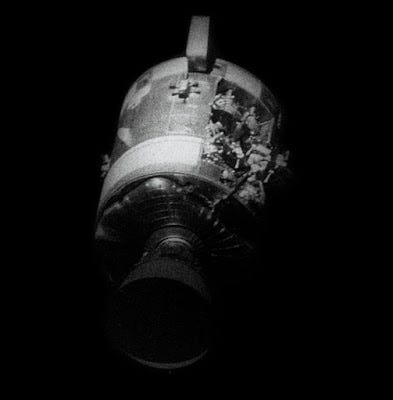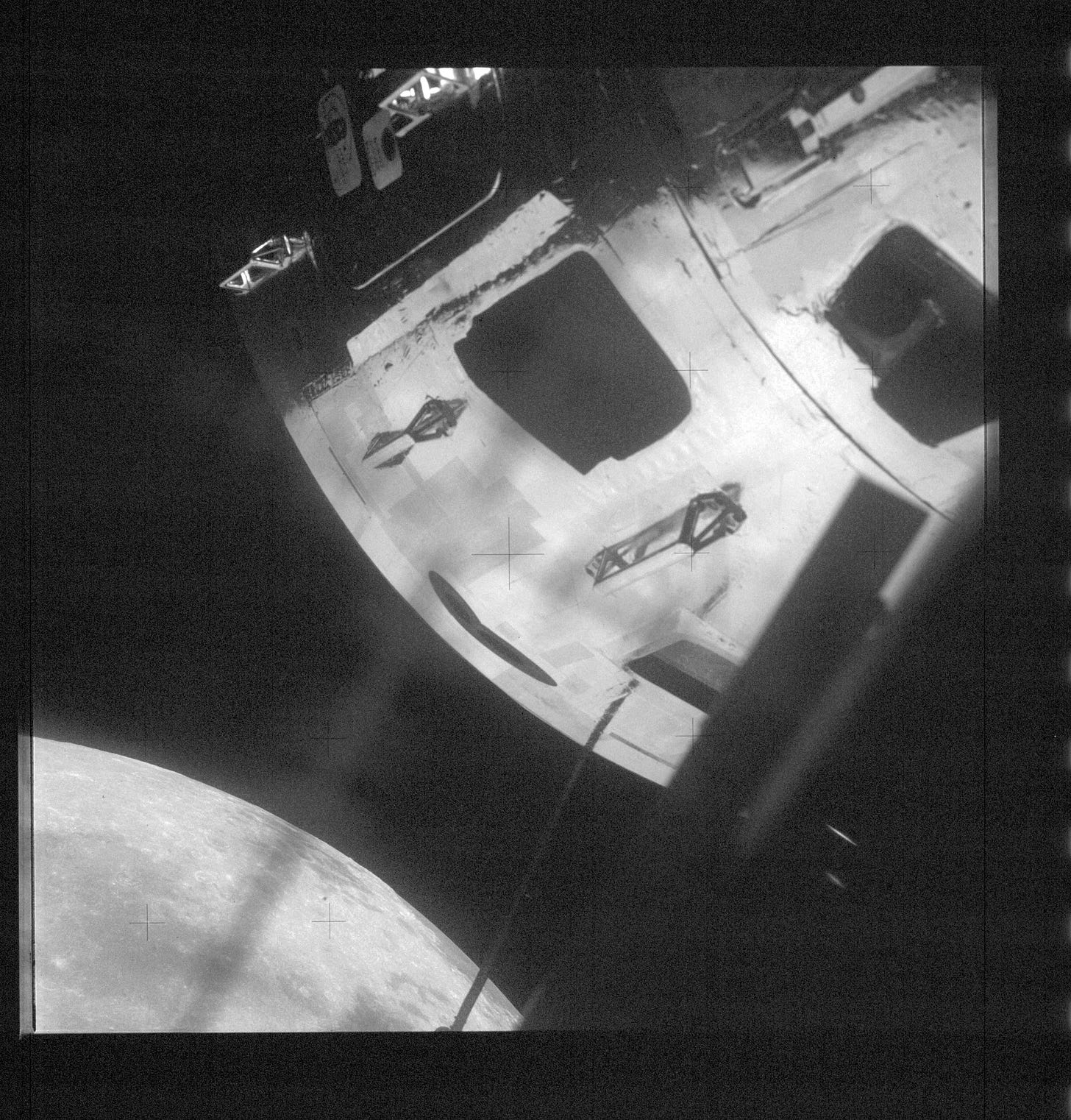Center of Gravity In No Gravity
NASA makes the impossible, possible.
All images in this article courtesy of NASA.
The near loss of three astronauts in the Apollo 13 disaster is probably one of the most dramatic events in the history of the moon landings. It was NASA’s finest moment as the “can do agency” to get those astronauts home safely. A closer look brings up lots of anomalies and unanswered questions.
By now we know the story and the movie. The public’s interest was waning as the moon landings got too routine. Then in 1970, Apollo 13 on its way to the moon, suffered an oxygen tank blow on the command module and the three astronauts, James Lovell, Jack Swigert and Fred Haise had a life or death situation on their hands because the tank explosion also ruined the power systems and ended any chance of accomplishing a landing. The LM (lunar landing module), still in perfect working order, became the lifeboat and the means of arriving home. Any problems that ensued the wunderkinds at NASA came to the rescue. Of note, the jury-rigged carbon dioxide filter that could have ended the astronaut’s lives simply by exhaling. Good thing they had duct tape onboard!
Jim Lovell’s Book
It’s probably best to go to the source. Jim Lovell’s book, with co-author Jeffery Kluger, Apollo 13 published in 2000 for the 30th anniversary of the mission, is the recent version of Lost Moon, published in 1994. It’s a gripping read and well written but filled with peculiarities and scientific oddities that Lovell should have addressed and corrected.
The strangest part of the book is the constant use of weight as a measurement system. For example, on page 123, it is stated that the fuel cells were pressurized at 300 pounds per square inch and one of the damaged oxygen tanks was leaking, and eventually, 218 pounds of oxygen would bleed off. (Page 104 lists 320 pounds of oxygen in the tank before the damage took place.)
My word, that 1960’s NASA technology is amazing! Only they could have a tank holding over 200 pounds of oxygen in zero gravity! I fail to understand how this is possible or how weight such as this, could be measured in a gravity free environment. Perhaps they used some other method of measuring the volume in the tank? There is the other issue of pressuring tanks at “pounds per square inch” or PSI, which is a pressure system based on gravity—pounds equals weight. How does that translate to zero G? It is common knowledge that in zero gravity everything weighs nothing. If you read the reviews of the book on Amazon, most of which offer high praise, nobody ever points this out.
This weight issue drives through many of the areas of this Apollo 13 account, as well as many other books by the other astronauts.
In another example, after the explosion, Jim Lovell had a hard time at first keeping both spacecraft's attitude in proper alignment. The reason given on page 148 is that the added “weight” of the command module, coming in at 63,400 pounds, was causing the problem. I kid you not! At this stage, they are in cis lunar space—it’s a weightless environment. How could CSM create such huge trouble? It should be as weightless as the astronauts are. It was actually stated that the attached command module was throwing off “the center of gravity” of both the ships. As if there is a center of gravity in no gravity! Please note this is not an issue on a normal mission when the command module is in control and LEM is docked and not being used to transit to the moon. But suddenly there is a problem with a dead command module.
And they don’t stop there. Later, NASA had the backup astronauts test various strategies in the flight simulators, such as piloting the LEM with the added “weight” of the command module docked (p. 225). Again, what weight? Why is this irrelevant and time wasting exercise? They are in zero gravity, everything weighs nothing. And not a single reviewer of this book on Amazon has an issue with this.
Obviously, I have no background in astrophysics. But what is written in this account of the Apollo disaster makes no relative sense. The authors are saying that weight in zero gravity exists and is producing an influence on many spacecraft systems from fuel tanks to flight attitude control. (This carries over to the Apollo 13 Mission Report, link below, that states at launch there was 338 pounds of water in the LM. At the end there was 50 pounds left. Where is the weight coming from? How would they possibly measure it? Even NASA, it seems, is into this weight in zero gravity nonsense.)
They are in zero gravity, everything weighs nothing. And not a single reviewer of this book on Amazon has an issue with this.
Perhaps this account of Apollo 13 is a book written in a dumbed down fashion, so the average person could enjoy the narrative and the heroics and not get bogged down in technical details. And it should be noted that there are various technical facts that are omitted. One may research elsewhere online to uncover those details.
Did this dramatic event actually happen?
Endnotes
The following image is from NASA’s Flickr album. It is unknown what this image is about but it’s from their Apollo 13 photo archive. One can see the CSM capsule only with the rest of the ship (equipment bay and life support) missing and what appears to be a cable attached. While it was jettisoned before the LEM was, the moon is too close. They should be close to earth within a few hours of reentry. Perhaps a secret image released by a whistleblower? It’s a mystery.
Sources
Apollo 13, Jim Lovell with Jeffery Kluger, Houghton Milfflen Company, 2000.
Center of gravity, center of mass
https://study.com/academy/lesson/understanding-the-center-of-mass-center-of-gravity.html
Apollo 13 Mission report


